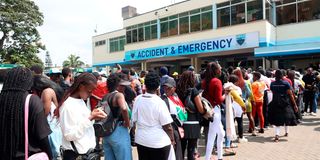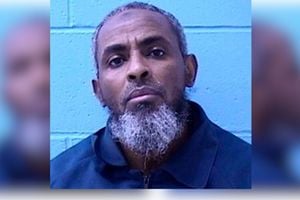Medical legal cases: Enlighten doctors on interaction with IPOA

Youths queue at Kenyatta National Hospital in Nairobi on June 30, 2024 to visit their colleagues who were shot and injured by police officers during anti-Finance Bill protests
What you need to know:
- We have had cases where police officers accompany someone with gunshots and wait outside the operating theatre, not for the news about the success of the surgery but for immediate custody of bullets and shrapnel retrieved from the victims’ bodies in order to control the course of investigations.
‘Doctor, someone is asking for you urgently at the theatre entrance’, the nurse called out. I was just about to scrub in, don the surgical garb and jump into an emergency procedure. The patient had been referred in with gunshot wounds. I thought about it for a second and wanted to wish that someone away. But it could be another dire emergency.
I bestrode the corridor in seconds and got to the main theatre reception, where two people were waiting for me. “We are from the Independent Policing Oversight Authority (IPOA). It is regarding that patient,” they announced. IPOA? That was fast!
Had it been the police, I would have easily recapped the steps to manage the medical legal case at hand.
Every time we operate on patients with gunshot wounds, we are able to document the details of the injury including the location and size of bullet wounds in a way that forensic experts can reconstruct them. With accurate description of a gunshot wound, a forensic investigator can establish the entry and exit, the likely position of the assailant relative to the victim and even a postulated class of the weapon.
“We would like you to gather as much information as you can with this case,” the team briefed me. I tried to recap how we always preserve any bullet(s) retrieved and give it to the police.“That is the problem. We fear the police may be involved." I was now more confused.
After arguing how it was a normal procedure to give police such retrieved material, I found myself loudly doubting what I was doing. I do not know how many doctors have come across the IPOA team and how many can answer to this scenario.
‘To conduct impartial and independent investigations, inspections, audits and monitoring of the National Police Service to prevent impunity and enhance professionalism in the interest of the public’ is the Mission on IPOA’s website.
The scenario I encountered throws doctors in a quandary. Based on precedence, a majority of them do not know which cases they are needed to inform IPOA. Most importantly, doctors are inclined, from experience, to give the details to 'the crown and the uniform'. A little bit of public education by IPOA should enlighten us on the management of patients who may exhibit injuries resulting from police brutality. Even more, medics need to be briefed on the chain of custody of any materials where IPOA suspects police brutality.
The patient themselves are a moving crime scene of immense interest to IPOA and the police alike. It is in this conundrum that I had found myself two years back that afternoon when I was told someone needed me urgently at the theatre entrance.
Luckily, from the current spate of injuries arising from the Finance bill protests, I was not a visitor in Jerusalem when a letter from IPOA came through recently addressed to my office to provide the authority with details on cases seen in our hospital arising from the protest-related injuries. I suggest two ways which IPOA can sensitise the medical fraternity about their important role:
First, they should visit as many doctors and hospitals as possible and give a brief on their mandate and how it links up with the doctors and the police. They can share a basic checklist that highlights and heightens the index of suspicion among doctors when handling possible cases of police brutality. That way, the doctors will be able to discern which cases may need IPOA.
We have had cases where police officers accompany someone with gunshots and wait outside the operating theatre, not for the news about the success of the surgery but for immediate custody of bullets and shrapnel retrieved from the victims’ bodies in order to control the course of investigations.
Secondly, IPOA should educate and empower patients to direct their doctors to hand over medicolegal evidence to IPOA in cases where the patient has a complaint against the police. Doctors have a duty to consider the well-being of their patient first. If a patient directs us to only share the retrieved material from their bodies to IPOA or only release them to the police in the presence of an IPOA officer, it would go a long way when the doctors are faced by a power struggle between the two bodies while their patients’ lives are at stake. With this model, IPOA can issue prescribed forms and checklists that patients or their next of kin can sign , which then compel the doctor to not give out this crucial evidence to the police.
Dr Aruyaru is a consultant general surgeon




